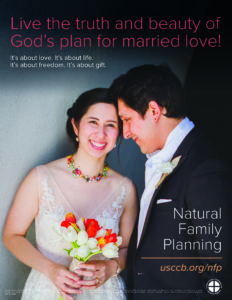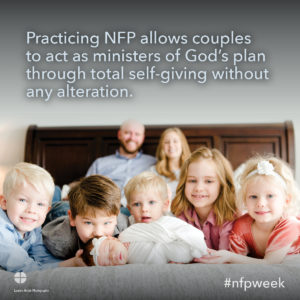 NFP and God’s Design for Married Love
NFP and God’s Design for Married Love
It’s National Natural Family Planning (NFP) Awareness Week! In this post, we continue to discuss what it means to be “open to life.” Last time, we discussed a fertility “treatment” that is contrary to the good of the spouses and the good of human life: In vitro fertilization. This month, we’re going to switch gears and talk about Natural Family Planning, the only authentic way of family planning that respects God’s design for married love. We will explore what makes Natural Family Planning “natural” and why it is oriented towards the good of the spouses and their children.
What is NFP? NFP is a term that encompasses certain methods of family planning that can be used to achieve or avoid conception naturally. NFP methods are based on observing the naturally occurring signs and symptoms of the fertile and infertile phases of a woman’s menstrual cycle.[1] This is one sense in which NFP is “natural”: NFP does not rely on drugs, devices, or surgical procedures to plan or prevent pregnancy. In another sense, NFP is natural because it complements and supports God’s design for human nature and God’s design for marriage, which is written into human nature itself.
Let’s take a closer look at the nature of marriage and God’s design for married love. Marriage is both a natural and a supernatural reality. [2] This means that marriage is written into God’s creation, “in the very natur e of man and woman as they came from the hand of the Creator” (CCC, 1603) , and that this natural relationship has been elevated by Jesus Christ to a sacrament. Marriage is a sign of God’s love for His Bride, the Church, and it is a source of sanctifying grace.[3]
e of man and woman as they came from the hand of the Creator” (CCC, 1603) , and that this natural relationship has been elevated by Jesus Christ to a sacrament. Marriage is a sign of God’s love for His Bride, the Church, and it is a source of sanctifying grace.[3]
The marriage bond is a lifelong and indissoluble commitment. In marriage, man and woman are united as one flesh, one heart, and one soul. At the heart of the one-flesh union is the sexual embrace. The spouses integrate God’s gift of human sexuality into their relationship by giving themselves to one another entirely. This entails that the married couple be open to children. The married couple recognizes that sexual intercourse is “ordered … toward the good of the spouses and the procreation and education of children” (CIC, c. 1055 §1) . The good of the spouses is called the “unitive” end of sexual intercourse, while the “procreation and education of children” is called the “procreative end.” It is crucial that these two ends or purposes are not severed or separated from each other.
How does NFP work in harmony with God’s design for marriage? NFP acknowledges that the human body reflects both the unitive and procreative ends of marriage. Man and woman’s bodies are complementary; only a man and a woman, through their distinctive otherness that is ordered to each other, can fully unite in the conjugal embrace. NFP also affirms that our reproductive systems were designed for a distinct end or purpose: procreation.[4] NFP is designed to support this reality, and its methods do nothing to interfere with the purposes of our reproductive organs. To prevent or postpone a pregnancy, a couple that practices NFP will abstain from sexual intercourse during the wife’s fertile window. By contrast, a couple that uses contraceptives prevent pregnancy by deliberately inhibiting the proper purpose of their sexual organs.
Deliberately inhibiting conception is different from consciously limiting intercourse to one’s infertile window. A couple that practices NFP may decide that now is not the right time to have another child but still want to experience the unity and intimacy of sexual intercourse. This is a good thing! Limiting sexual intercourse to the times when conception is unlikely does not mean that they have rejected the procreative nature of sexual intercourse. Because the couple has consciously accepted that God’s design for marriage entails the procreation and education of children, the NFP-practicing couple effectively say to themselves, “We are not trying to have a baby right now, but if we were to conceive we are open to that life!” By contrast, a couple that uses contraceptives (so that they can have sex at any time) separates the unitive and procreative ends of the marital act as if to say, “I only want the pleasure and intimacy of intercourse right now, and an openness to children is not part of this experience.”
NFP educates the married couple to consider not only their own relationship a nd personal desires, but also those of their children! This is called responsible parenthood.[5] Planning one’s family responsibly does not simply mean avoiding pregnancies; rather, it is about encouraging couples to make decisions about the size of their families in ways that benefit the spousal relationship and the spouses’ relationship with their children.
nd personal desires, but also those of their children! This is called responsible parenthood.[5] Planning one’s family responsibly does not simply mean avoiding pregnancies; rather, it is about encouraging couples to make decisions about the size of their families in ways that benefit the spousal relationship and the spouses’ relationship with their children.
NFP also helps the married couple to strengthen their sacramental marriage bond, and it strengthens their receptivity to the special graces that they receive. The Church teaches that “Christian spouses have a special sacrament by which they are fortified and receive a kind of consecration in the duties and dignity of their state” (GS, no. 48) . NFP requires communication and cooperation between husband and wife. By practicing NFP together, the married couple grows in intimacy, communication, and perseverance while learning about God’s design for both the human body and for married love. NFP is designed to help the married couple fully integrate into their lives God’s design for marriage.
During this year’s NFP Awareness Week, let us continue to celebrate the truth and beauty of God’s plan for married love! To learn more, read the NFP FAQ’s, the USCCB’s “What We Believe” on Love and Sexuality, check out the Made for Love Podcast, or visit the FAQ’s on the Marriage: Unique for a Reason website.
[1] http://www.usccb.org/issues-and-action/marriage-and-family/natural-family-planning/
[2] To read more about natural marriage: Why is Marriage a Natural Institution?
[3] To read more about the sacrament of marriage: Sacramental Marriage
[4] To read more about human nature and natural ends: Nature Part One, Part Two, Part Three, Part Four
[5] http://www.usccb.org/issues-and-action/marriage-and-family/natural-family-planning/what-is-nfp/responsible-parenthood.cfm
About the Author: Bridget Groff is an M.A./Ph.D. student in the School of Philosophy at the Catholic University of America. She currently works part-time at the United States Conference of Catholic Bishops as an intern for the Subcommittee for the Promotion and Defense of Marriage.
Leave a Reply